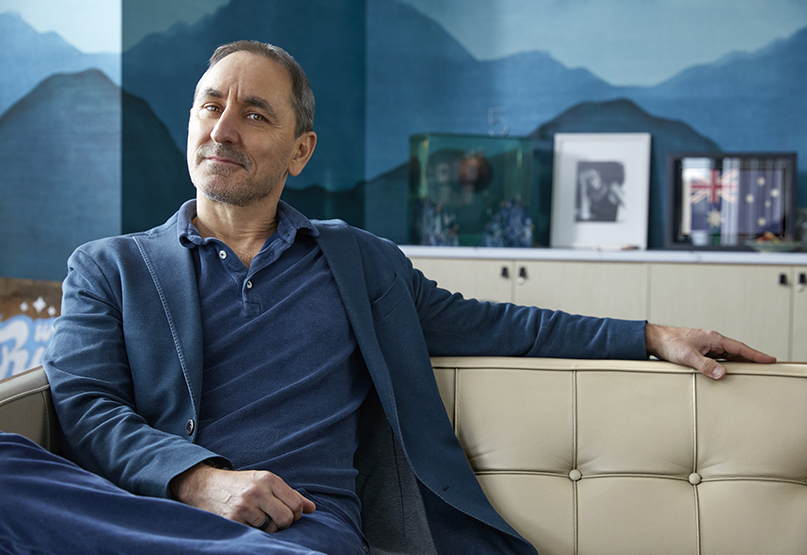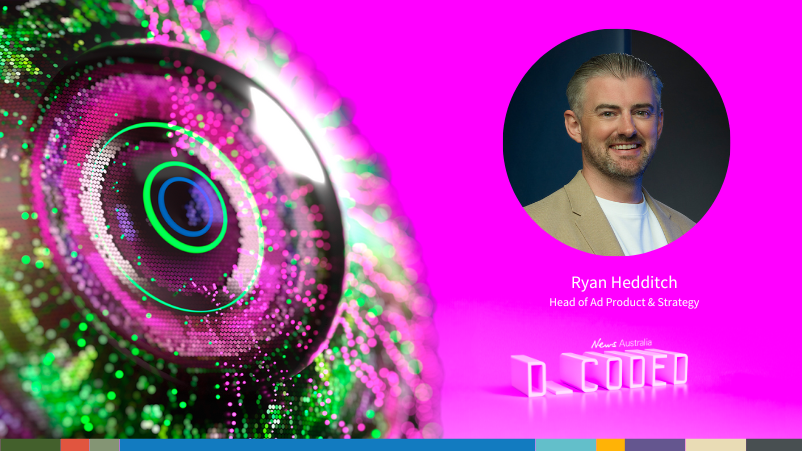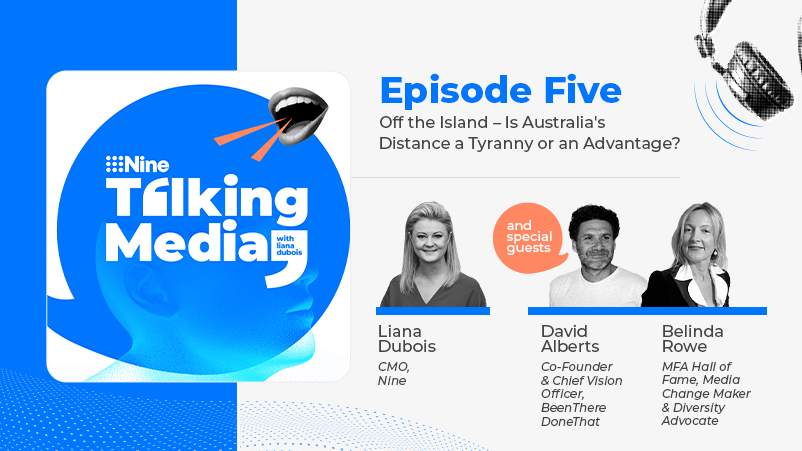Accenture Song chief David Droga on what business leaders want, when he can understand what they're talking about; Gen AI’s looming impact, The Monkeys losing Telstra; The Voice – and three words he’d tell his 18 year-old-self

David Droga: "I know that I've done a really great job, because C-Suites need more creative people in there. You want to bring the best and brightest to solve for where you're going." Pic: Accenture Song
Accenture Song chief David Droga runs the creative and digital powerhouse at the heart of a professional services giant employing 700,000 people in 120 countries. The founder of Droga5 and brains behind some of the world's most iconic advertising campaigns, including the Tourism Australia Dundee spoof, admits he is still learning about the power of tech, data and creative. He thinks the nation's creative brilliance is not being sold as well as Tourism Australia campaigns – such as the current Say G'Day and Droga5's iconic Dundee work. He also reckons there is too much short-termism and a relentless focus on "fireworks" and the creative industry needs to balance this out with more "lighthouse" campaigns that CEOs and CMOs require. There are few people better positioned to run the rule over the advertising industry, and Droga doesn't pull any punches. He wants quality and evolution, and maybe one day, to become Australia's next PM.
What you need to know:
- David Droga wants creatives at the top table, but warns that the industry either embraces technology, including generative AI, or gets left behind.
- He also thinks too much advertising is about short-term "fireworks" rather than foundational longer-term "lighthouse" work.
- Accenture Song is investing $3bn into Gen AI, and upskilling staff a pace. Droga thinks generative AI won't devour jobs. But the people who can operate it will – and the industry needs to embrace the technology or get left behind.
- A proud Australian and advocate for indigenous empowerment, he was deeply saddened by Australia rejecting The Voice referendum.
- One word of advice for young creatives: always focus on quality.
The best way for me to preserve the power of creativity, is to make creativity have a more profound impact on business and society. That's the way to build the credibility for creativity, not around the emotional... sort of the romance of it.
“Quality always wins”. Those are the three words that Accenture Song global CEO David Droga – the 55-year-old who is the most decorated creative on the planet would advise an 18-year-old David Droga working the mailroom at Grey Sydney in the late 1980s.
In a world where AI “should blow up mediocre advertising”, it’s sound advice.
Sitting down with Mi3 at Accenture’s Sydney Barangaroo offices, Droga wants the industry to double down on what it does well, but catch up with the times – and believes creativity should have a seat at the top table rather than “chasing some sort of hype cycle”, e.g, “metaverse, metaverse, metaverse”.
Droga is a staunch believer that creativity is in more demand than at any time in his career, but it’s also facing a reckoning, not least from AI.
Accenture Song has set aside $3bn towards sharpening its AI technology capabilities, and the ad industry either swims with the changing tide or gets washed away into the ether. The global agency-consultancy hybrid netted US$16 billion in revenue in 2022, a 28 per cent increase from 2021's US$12.5 billion. In Australia, its brands include The Monkeys, Maud, Fjord and FiftyFive5.
Droga has been at the helm of Accenture Song for the past two years and makes no bones about the "immense and amazing" transition from top creative at Droga5 to business leader of a multi-disciplinary beast spanning 120 countries.
"I've learned that there's a lot of stuff I need to learn, which was part of the reason I took the job, because I believe in the combination of these things (technology, data and creative) coming together," he said.
"Droga5, as proud as I am of what we do and have done, were usually brought in further downstream to solve for clients with marketing and communications. Whereas a lot of times now at Accenture Song, we're way upstream in the transformation of industries, more so than just the storyteller and communication part of things.
"That's where it's phenomenal. Some of the biggest CEOs in the world, we get to sit in rooms with them and hear, transparently, what challenges they face, what opportunities are in front of them.
"I joke that in my new role, a third of the conversations I don't understand what's being said, a third of the conversations I don't know why we're having the conversations, and a third of the conversation I'm blown away that we're having a conversation. So my primary role is to interpret the first third, get rid of the second third, and just focus on the final third."
What business leaders want
Droga is one of the creatives who regularly gets invited by business and political leaders to talk at the top table. He would like top creatives across adland to have a similar influence. So what's on clients' mind?
“I’m not trying to sell one thing,” he added. “And it makes for very interesting, open and constructive conversations. I came from a world of immense confidence. And I loved what we did, and we've done with Droga5. But I realised that no matter how skilled we were, or the expertise we had in certain categories, it can't solve everything.
“I could draw attention or make you care about something, or make something emotional. But if what’s happening behind the firewall, customer experience or the supply chain isn't working, it's all irrelevant.”
Droga is not saying advertising should move away from emotive, powerful work, “It's just not the only option”.
“I think things are really powerful, when you choose to do it because it's the right thing to do, as opposed to you're doing it because it's the only thing you know how to do. That's a very different thing. I still believe in the power of creativity, whatever vessel it shows up in.
"The addition of data and technology as a necessary component of our industry."
Droga said the industry needs to focus on two things: relevance and growth; it’s the one “unifying thing in every conversation I have”, whether its with a trillion dollar company, a startup, a government official, or a run of the mill company: “They're all chasing growth and relevance,” he said. “If you look behind closed doors, whatever your departments are called, or what your titles are, all clients just care that you can solve for them.”
Droga is blunt about the economic reality of today. He flippantly remarks that it requires the industry to ensure brands are relevant – always on the pulse – and are growing. Relevance and growth are his dogma – and literally Accenture Song's strapline.
“If you aren’t growing, you are shrinking,” he said. “Relevance is this evergreen thing for us, which also I love, because it forces us to not settle.
“We always have to be innovating, we always have to be moving forward, we always have to be on the pulse, either defining things, or at least at the cutting edge of stuff. We also need to have the credibility of actually pulling it off.”
Lighthouse versus fireworks
Creatives need help businesses transform and “show up in a way” that moves beyond the “veneer of things”. It’s not just about marketing and design, it could involve how companies interact with their customers and supply chain, per Droga.
He calls this the "lighthouse and fireworks" of creative, and said too much attention has been focused on fireworks-style campaigns when what many businesses are looking for is more akin to lighthouse campaigns.
“We should aspire to do both. You know, sometimes the brief is too create the best fireworks, but I don't want all the glory and all the energy just to go into that. What we (led by The Monkeys) did for the Opera House (see video below), fireworks, what they just did for the ATO, lighthouse.
"They've built something substantial that is going to change the way people interface with Australian Tax Office and make it an easy shorthand for people to for their identities to be used across there and feel secure about that. That's not a firework but it’s an important lighthouse and is done beautifully with the consumer in mind. The back end needs to be robust and secure, the front end needs to be intuitive because you are dealing with people’s time and customer experience.”
Creative chaff sorting
Droga is one of the best known advertising leaders of the past 30 years. Since he famously began in the mailroom of Grey in the 1980s, he made waves with one of his earlier campaigns for the street style fashion brand Ecko, ‘Still Free’, which involved spray painting the president’s US Air Force Jet One with tags and branding (see below).
The agency he set up in 2006, Droga5, played a pivotal role in swaying the jewish community in the US to vote for Barack Obama at a time Republicans painted Obama as Muslim. His agency is also behind Puma’s ‘Hardchorus’, the UNICEF Tap Project, Microsoft Bing’s Decode Jay Z and Prudential’s ‘Day One’.
Accolades aside, Droga believes that not all creativity is created equal and worth saving or preserving, and Generative AI will eventually replace mediocrity, which Droga made clear in his SxSW Sydney session – it will rapidly separate the wheat from the chaff.
“Not everything that our industry is producing – in fact the majority of it – is creative. AI could do a better job of the majority of stuff that's put out into the universe,” he said.
“The best way for me to preserve the power of creativity, is to make creativity have a more profound impact on business and society. That's the way to build the credibility for creativity, not around the emotional ... you know, just the feel of it, or the sort of the romance of it.
“Obviously, digital became a game changer for our industry, everyone was thinking that was going to wipe out the traditional sense of things but what it did was widen the aperture for us all. So, yes, the titles may change. But the idea of having people that are connected as being problem solvers in the disciplines that they bring to bear will not change.”
When asked whether machines are going to replace people, he said: “Gen AI is not going to replace people, people who understand Gen AI are going to replace people. Success is not nostalgic.”
Droga likens this evolution to the Blackberry, a smartphone ahead of its time that swayed the business community but refused to evolve and was eventually replaced by iPhones and others.
“They were myopic and about it and not what was coming down the pipe, and they just got taken out by not understanding where things were going and what could emerge.”
Big tech bets
Droga is a self-confessed optimist, but in reality he is also a pragmatist, and says the industry does not focus enough on using technology in the right way. He is concerned that the industry is not changing fast enough to meet future demands.
“I think what happens is the hype cycle and the hype bubble of what people say, versus what they do, are not in sync. Sometimes in our industry, they'll just change someone's title to match what they think that the client wants to hear versus the expertise and the skill-set they are trained to do.”
On this front, Accenture Song is investing a portion of its $3bn investment in Gen AI on upskilling and “in-depth” training and recruiting the next generation of talent, but that’s not all.
“We've also been investing in some emerging platforms and companies in the US, we just announced one with the content generating platform Writer, which is a generic tool to help people write,” he said.
“We're making bets in lots of places. And then also, at the same time, we're piloting programmes with our clients. We're putting money on the table saying we're going to work with you on tech, whether it be in healthcare or banking or automotive or retail – we're actually building some things in lockstep with them.”
The sad thing is it doesn't surprise me when that happens, and it happens all over the world with some of the most enduring relationships between clients and agencies... sometimes people think that they have to change things to prove something.
The Telstra loss
Droga spoke to Mi3 a week after Telstra officially severed ties with its long-term creative agency The Monkeys.
He said The Monkeys work for Telstra speaks for itself, including the recent This is Country Footy campaign – but there are always other big fish in the sea.
“The sad thing is it doesn't surprise me when that happens, and it happens all over the world with some of the most enduring relationships between clients and agencies,” he said. “That is because, sometimes people think that they have to change things to prove something or sometimes it might be a clash between people, I don't know the situation... But it's a shame. The Monkeys are brilliant and their talents can be applied to other places, they'll be fine.”
Short-termism is something Droga said the industry has been conditioned to, and often it does not give work time to breathe and grow. He said that Tourism Australia’s current Say G’day campaign – a textbook example of following the marketing effectiveness rulebook – is a good example of a platform that should be given the time to develop and not not be sneered at by “judgy and cynical people obsessed by short-term fireworks".
Jingoism aside... Aussie rules
In Australia, Droga has been described by those who know him well as a ”curious, loyal, innovator" but also "competitive and relentless". On the competitive front, he's famously won more Cannes Lions trophies than anybody else, but in person is remarkably down to earth.
Droga was behind one of Tourism Australia’s most famous campaigns, Dundee: The Son of a Legend Returns Home, a star-studded spoof that stole the show in Super Bowl 2018.
His work over many years paints a picture of what the real David Droga is like: he has a Breaking Bad-esque sense of humour; is cautiously optimistic; and “obsessed” with Australia.
“I think pound-for-pound Australians and Australia does about as well as anywhere in the world in terms of our standing of what we could be and we are in the creatives space," he said.
“We inherited one of the best hands ever. When you think about location, climate, people, you think about all those things – and that was our pitch to the US – was the very best thing about Australia that's going beyond our food and beaches are Australians.
“Everyone likes an Australian. We're friendly, which I think goes a long way. I want us to get a little bit more credit for our smarts and our innovation. I don't want us to be the willing and friendly sidekick, we have so much more than that.”
If you can step back away from it. You need to think, ‘what do the people funding the ‘No’ campaign have to gain – not ordinary Australians.
The Voice: ‘I’m sad for Australia’
In spite of his pride to represent Australia on the global stage, a part of Droga was crushed this month.
He and his brother Daniel have invested substantial money in recent years to help train First Nations people to become architects in a scheme that sought to enable First Nations with skills, rather than rhetoric.
He likened the ‘No’ campaign tactics as coming from the same playbook as the US gun lobby, the National Riffle Association.
“I thought it was a sad day for Australia,” he said. “If you can step back away from it, you need to think, ‘What do the people funding the ‘No’ campaign have to gain' – not ordinary Australians.
“Negative campaigning is easier, because saying ‘No’ is a really easy thing to do. It makes me sad that they spread false narratives. All you need to do is inject a little bit of fear and misinformation, and people retreat back to the safety cloak of ‘No, I don't want things to change'. Change is scary and change is unknown.”
But that doesn’t let the ‘Yes’ campaign off the hook. For disclosure, Accenture Song creative agency The Monkeys crafted a Yes campaign ad based on the Johnny Farnham classic, You’re The Voice (see above).
Droga said that in the polarised media – especially social media – landscape, lies need to be fought with truth and facts.
"The ‘Yes’ campaign could have certainly done a better job of popping the bubble of this misinformation and clarifying a few things about what it will be, what it won't be, and taking control of the narrative of what the ‘No’ campaign said,” he said.
At SxSW, Droga said he should run to be the next Prime Minister of Australia in jest. He might be onto something. In the meantime, advertising agencies should take note: become the change the world needs, or get left behind. His parting words of advice:
"If I think about myself at 18 and now, I've always cared about the outcome of work that I did. Just stay obsessed with the ramifications of what you do, and believe in quality will get you there. Quality always wins. It doesn't mean you always win, or everything you do wins. But by and large, caring and quality will always work and that'll protect you wherever you go."



